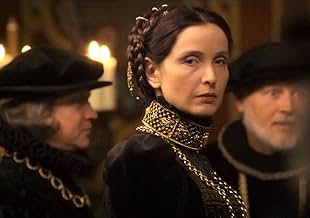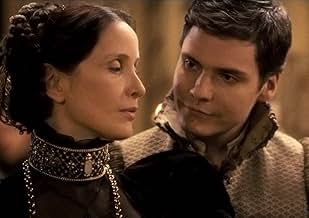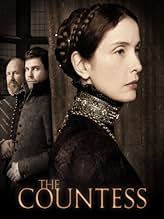IMDb रेटिंग
6.2/10
8.8 हज़ार
आपकी रेटिंग
अपनी भाषा में प्लॉट जोड़ेंA 17th century Hungarian countess embarks on a murderous undertaking, with the belief that bathing in the blood of virgins will preserve her beauty.A 17th century Hungarian countess embarks on a murderous undertaking, with the belief that bathing in the blood of virgins will preserve her beauty.A 17th century Hungarian countess embarks on a murderous undertaking, with the belief that bathing in the blood of virgins will preserve her beauty.
- पुरस्कार
- 1 जीत और कुल 1 नामांकन
Andy Gätjen
- Miklos
- (as Andy Gatjen)
कहानी
क्या आपको पता है
- ट्रिवियाJulie Delpy revealed in a 2014 interview with entertainment reporter Darby Maloney that the film was a huge success in France, so successful that she is practically guaranteed financial backing from French financiers for any project she wants to pursue in the future.
- गूफ़At about 1h15m, the fifth book on the shelf is the "Dictionnaire De Boyer". Abel Boyer did write a French-English dictionary, but he was born in 1664 and Countess Báthory died in 1614.
- भाव
Gyorgy Thurzo: Love is a myth, to keep the minds of young peasants and virgins occupied with a dream.
- साउंडट्रैकCouranta VI
Solinger Streichquartett
Written by Isaak Pesch
From the album "Telemusik"
© & ® Peter Lamprecht
Courtesy of Solinger Streichquartett/Peter Lamprecht
फीचर्ड रिव्यू
Film lovers and connoisseurs looking for a significant example of an auteur film from the first decade of the 3rd millennium can choose 'The Countess' without hesitation. Made in 2009 as a Franco-German co-production with international distribution, the film is written and directed by Julie Delpy, who also plays the title role. On top of that, she is also a co-producer and the composer of the film's music. The screenplay picks up a story that has already been told in dozens of books and films that adapt those books or invent original versions - the story of the bloody Countess Elisabeth (Erzsébet) Báthori, alleged serial killer and mother of all the heroes and heroines of 'Gothic' horror books and of vampire movies. She was a genuine character from Hungarian history of the 16th and 17th centuries, a woman whose real life has long been amplified and distorted by the legends built around her. Screenwriter Julie Delpy's version questions the historical accounts and the legends developed around them and focuses on the heroine's evolution and the origin of the deeds attributed to her. Without denying them, the story we see on the screen proposes a reading in a feminist key, in the political context of Central Europe of that historical period, superimposed on an unfortunate love story.
Erzsébet Báthori - whose name is spelled out in the film as Erzebet - is born in the 16th century in a small Hungary, which was desperately struggling to survive on the map of Europe. It is also a time of witches and of the Inquisition and an era in which women have few rights, even if they belong to the nobility. Destined from birth to a forced marriage, the heroine of the film goes through a childhood traumatized by violence followed by adolescence in which an unexpected pregnancy ends with the death penalty in terrible tortures of the lover (a boy from the peasants class). The husband is one of Hungary's great warriors, and upon his death (possibly poisoned by the king who owed him considerable fortunes, it is suggested) the countess takes over the husband's affairs with no intention of remarrying, as social conventions required. A love affair with a nobleman 18 years her junior has no chance, as he belongs to the Thurzo family, the Báthori clan's competitors in dominating what was left of Hungary. Erzsébet blames the failure of the relationship on the age difference, and is ready to do anything to erase it. A random incident makes her believe that the blood of young women, necessarily virgins, can at least physically restore the appearance of youth. Is it her decision, is this about a personality warped to murder, or because the encouragement she received from her enemies? Doom is inevitable, but is she alone responsible? Hell has many nuances, the director and screenwriter seems to say.
Julie Delpy tries to keep the balance between horror cinema and feminist drama, both in historical context. Scenes depicting the brutality and violence of the era are sprinkled throughout the film and generally consist of very brief flashes of seconds or less. Without denying the crimes attributed to the heroine, Julie Delpy avoids some details that have become common in legends (such as the bloodbaths) and questions the judgment applied to the heroine by contemporaries and history. She does it, unfortunately, using voice-over, a procedure that I like less and which seems to me unjustified considering the talent of the director in visually creating the relationships between the characters and reconstructing the era in its spirit and not necessarily in details . The team of actors is select. Delpy casts herself in the copious lead role, one of the best of her career. William Hurt as Thurzo the father is charismatic as always and Daniel Brühl is a perfect fit as the son. In my opinion, however, the most memorable role belongs to Anamaria Marinca, who embodies Darvulia - the servant, confidante, mistress and the only being who seems to have true and steadfast feelings for Erzsébet. The balance between romance, horror and drama is successful, perhaps a little too successful, and therefore the film gives the impression (and has been criticized) of a certain coolness. I personally liked this middle ground solution, which makes this version of Countess Báthori's story avoid cinematographic genre categorizations and let the audience decide.
Erzsébet Báthori - whose name is spelled out in the film as Erzebet - is born in the 16th century in a small Hungary, which was desperately struggling to survive on the map of Europe. It is also a time of witches and of the Inquisition and an era in which women have few rights, even if they belong to the nobility. Destined from birth to a forced marriage, the heroine of the film goes through a childhood traumatized by violence followed by adolescence in which an unexpected pregnancy ends with the death penalty in terrible tortures of the lover (a boy from the peasants class). The husband is one of Hungary's great warriors, and upon his death (possibly poisoned by the king who owed him considerable fortunes, it is suggested) the countess takes over the husband's affairs with no intention of remarrying, as social conventions required. A love affair with a nobleman 18 years her junior has no chance, as he belongs to the Thurzo family, the Báthori clan's competitors in dominating what was left of Hungary. Erzsébet blames the failure of the relationship on the age difference, and is ready to do anything to erase it. A random incident makes her believe that the blood of young women, necessarily virgins, can at least physically restore the appearance of youth. Is it her decision, is this about a personality warped to murder, or because the encouragement she received from her enemies? Doom is inevitable, but is she alone responsible? Hell has many nuances, the director and screenwriter seems to say.
Julie Delpy tries to keep the balance between horror cinema and feminist drama, both in historical context. Scenes depicting the brutality and violence of the era are sprinkled throughout the film and generally consist of very brief flashes of seconds or less. Without denying the crimes attributed to the heroine, Julie Delpy avoids some details that have become common in legends (such as the bloodbaths) and questions the judgment applied to the heroine by contemporaries and history. She does it, unfortunately, using voice-over, a procedure that I like less and which seems to me unjustified considering the talent of the director in visually creating the relationships between the characters and reconstructing the era in its spirit and not necessarily in details . The team of actors is select. Delpy casts herself in the copious lead role, one of the best of her career. William Hurt as Thurzo the father is charismatic as always and Daniel Brühl is a perfect fit as the son. In my opinion, however, the most memorable role belongs to Anamaria Marinca, who embodies Darvulia - the servant, confidante, mistress and the only being who seems to have true and steadfast feelings for Erzsébet. The balance between romance, horror and drama is successful, perhaps a little too successful, and therefore the film gives the impression (and has been criticized) of a certain coolness. I personally liked this middle ground solution, which makes this version of Countess Báthori's story avoid cinematographic genre categorizations and let the audience decide.
टॉप पसंद
रेटिंग देने के लिए साइन-इन करें और वैयक्तिकृत सुझावों के लिए वॉचलिस्ट करें
- How long is The Countess?Alexa द्वारा संचालित
विवरण
- रिलीज़ की तारीख़
- कंट्री ऑफ़ ओरिजिन
- आधिकारिक साइटें
- भाषाएं
- इस रूप में भी जाना जाता है
- Bathory
- फ़िल्माने की जगहें
- Burg Kriebstein, Kriebstein, Saxony, जर्मनी(exteriors: Countess Bathory's castle)
- उत्पादन कंपनियां
- IMDbPro पर और कंपनी क्रेडिट देखें
बॉक्स ऑफ़िस
- बजट
- €57,00,000(अनुमानित)
- दुनिया भर में सकल
- $7,84,522
- चलने की अवधि1 घंटा 38 मिनट
- रंग
- ध्वनि मिश्रण
- पक्ष अनुपात
- 2.35 : 1
इस पेज में योगदान दें
किसी बदलाव का सुझाव दें या अनुपलब्ध कॉन्टेंट जोड़ें

































